From his passion for lotus flowers and traditional handicrafts, Mr. Kieu Cao Dung (Thach That, Hanoi) has cooperated with a company in Ninh Binh to realize the bold idea of making paper from discarded lotus pods. And from that type of paper, he continues to create many other products imbued with Vietnamese culture such as: paper lotus flowers, paper fans....
Nearly 5 years of searching for suitable materials
As an expert in hotel management, with a stable job with an income of thousands of USD/month, however, his passion for traditional handicrafts has led Kieu Cao Dung to a completely new direction. In 2016, he began to challenge himself with the project "Continuing the life of lotus". Accordingly, he researched and successfully made a conical hat from lotus leaves and turned the lotus flower into "immortal" (preserving the shape and color of a fresh lotus flower).

Then, in 2018, by chance, during a survey of the raw material area, Kieu Cao Dung saw people harvesting lotus seeds and dumping tons of lotus pods. Feeling it was too wasteful, while the composition of lotus pods has a lot of fiber, Mr. Dung came up with the idea of why not make paper from this raw material.
"The biggest challenge when making paper from lotus is how to bind the lotus fibers together. It took me nearly 5 years to travel to all regions and ethnic groups in Vietnam that have a papermaking profession to learn about traditional papermaking methods and find suitable adhesive materials, trying to use mucus from the mo tree, the slippery vine tree, etc., but all failed. Just when I was discouraged and wanted to give up, I accidentally learned about the powder of the boi loi tree, a type of powder that people in Hung Yen often use to make traditional incense. I tried it and found that it was completely compatible with lotus," Mr. Dung recalled.

Sharing about the process of making lotus paper, Mr. Dung said that after being collected, the lotus pods will be dried thoroughly, then boiled. The boiling time is from 8-10 hours, divided into stages (boil for 4 hours then let cool, then boil again for 2-3 more times, each time for 2 hours). From the thoroughly boiled lotus pods, Mr. Dung will tear them into small pieces and pound them by hand to get the fibers. The lotus fibers are soaked in lime water for about 3 months to make them whiter and softer. After that, he will use a mold to stir evenly and lift them firmly to get the wet paper product. After drying in the sun for 3 consecutive days, the lotus paper will loosen up and be pressed flat, which is the opposite of the process of making wind paper or ban paper because when making these 2 types of paper, people will press them before drying.
Basically, all the steps of making lotus paper are done by Mr. Dung by hand, without any machinery. Many techniques require meticulousness and deep understanding of the raw materials.

Bringing Vietnamese cultural images to international friends
Sharing the same passion and love for lotus flowers, owning a production chain related to lotus (including: supplying lotus seeds, growing lotus for flowers, seeds, tubers, making lotus tea, lotus leaf tea combined with providing tourism services), Ms. Le Thanh Huyen, Director of Hali Production, Import-Export and Trade Service Joint Stock Company (Ninh Binh) was very excited to know about Kieu Cao Dung and his idea of making paper from lotus flower pods.
"When I heard that lotus can be used to make paper, I was so happy that I invited Mr. Dung to Ninh Binh to cooperate in developing lotus products, extending the value chain of this special flower, thereby contributing to increasing income for local lotus farmers, as well as creating an interesting experience product for tourists - Ms. Le Thanh Huyen shared.
Mr. Kieu Cao Dung also said: Ninh Binh is a locality with quite large lotus growing areas with diverse and rich lotus species, and very developed tourism activities. Therefore, this is an ideal land for me to freely create lotus products. Moreover, lotus has a special role and position in both the spirituality and culture of Vietnamese people, so through lotus products, I hope to spread stories about the culture, people, and country of Vietnam to tourists and friends around the world.

In fact, after his success with lotus paper, Kieu Cao Dung created many other products imbued with Vietnamese culture. Specifically, he added a dipping agent to the process to create lotus paper. In addition, he went to Hue to learn the technique of making paper lotus flowers from the 400-year-old Thanh Tien paper flower village; went to Chang Son, Thach That, Hanoi to learn how to make paper fans...
What is special is that on each fan he makes, there are printed folk paintings such as Dong Ho paintings, Hang Trong paintings. In addition, he also collaborates with artists to create paintings on lotus paper covered with pearl powder.

Currently, the art of making lotus paper and handicraft products made from lotus paper are being displayed and demonstrated by Mr. Dung in collaboration with Hali Company at the Halihome homestay area (Kha Luong village, Ninh Thang commune, Hoa Lu district) and are loved and highly appreciated by many domestic and international tourists, who choose to buy them as souvenirs and home decorations.
Song Nguyen
Source




![[Photo] Prime Minister Pham Minh Chinh receives Country Director of the World Bank Regional Office for Vietnam, Laos, Cambodia](https://vphoto.vietnam.vn/thumb/1200x675/vietnam/resource/IMAGE/2025/5/15/2c7898852fa74a67a7d39e601e287d48)
![[Photo] In May, lotus flowers bloom in President Ho Chi Minh's hometown](https://vphoto.vietnam.vn/thumb/1200x675/vietnam/resource/IMAGE/2025/5/15/aed19c8fa5ef410ea0099d9ecf34d2ad)
![[Photo] President Luong Cuong attends the National Ceremony to honor Uncle Ho's Good Children](https://vphoto.vietnam.vn/thumb/1200x675/vietnam/resource/IMAGE/2025/5/15/9defa1e6e3e743f59a79f667b0b6b3db)












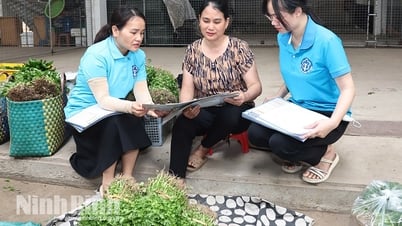


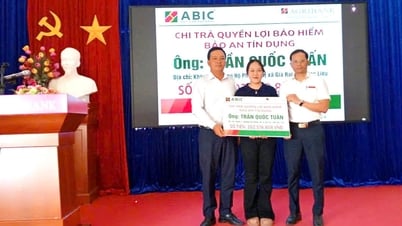

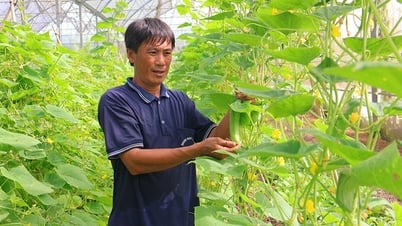















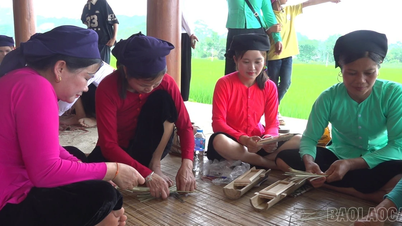

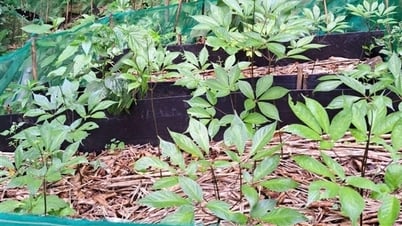














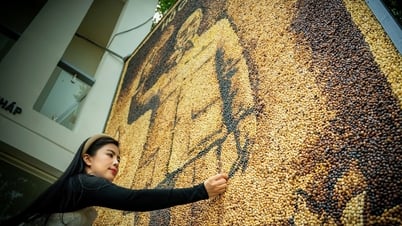






















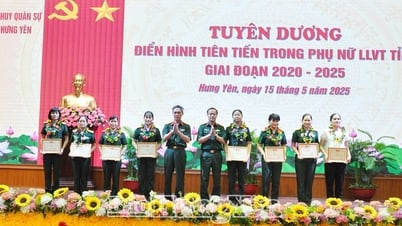


















Comment (0)